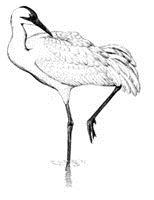North American Crane Working Group

Proceedings of the North American Crane Workshop
Date of this Version
2001
Document Type
Article
Citation
Ivey, Gary L. and Herziger, Caroline P. Using Ivermectin to increase survival of sandhill crane colts at Malheur National Wildlife Refuge, Oregon. In: Ellis, David H., ed., Proceedings of the Eighth North American Crane Workshop, 11–14 January 2000, Albuquerque, New Mexico (Seattle, Wash: North American Crane Working Group, 2001), pp. 166-169.
Abstract
Parasitic gapeworms (Cyathostoma sp.) caused 5.6% of mortalities of219 radiomarked greater sandhill crane (Grus canadensis tabida) colts at Malheur National Wildlife Refuge (NWR) in Oregon from 1991-98. From 1993-98 we tested the efficacy of ivennectin, an antihelmenthic drug, as a means of increasing colt survival by reducing gapewonn infestations. We selected pairs of siblings for the study, injecting 1 colt with ivennectin and not the other. We found significantly shorter survival times for untreated birds compared to those treated with ivennectin (P = 0.06). We conclude that in areas with gapewonn infestations in young cranes, the use of ivermectin will increase the colts' chances for survival, however, the procedure may not be practical in some field situations. Additional studies are needed on the epidemiology of gapeworms and its effects on recruitment of sandhill cranes.
Included in
Behavior and Ethology Commons, Biodiversity Commons, Ornithology Commons, Population Biology Commons, Terrestrial and Aquatic Ecology Commons


Comments
Reproduced by permission of the North American Crane Working Group (NACWG).